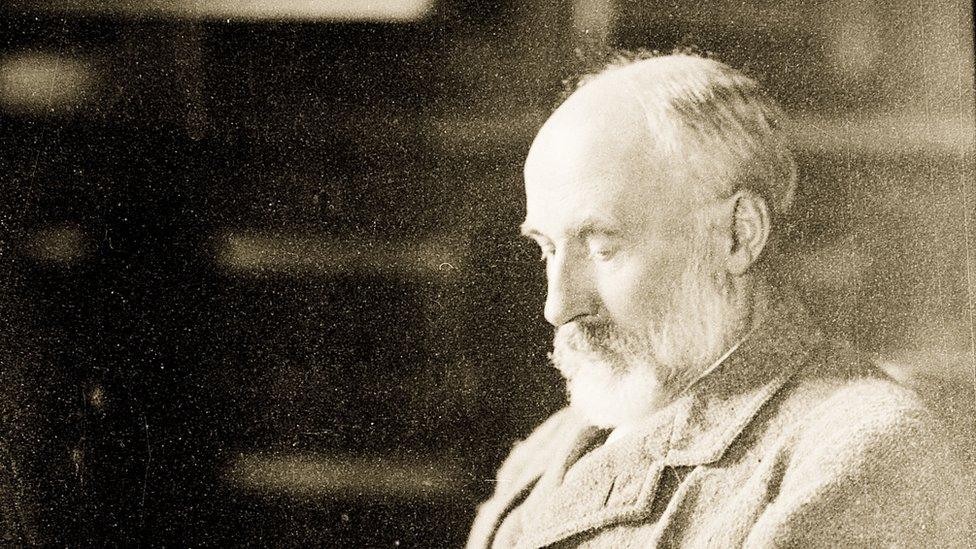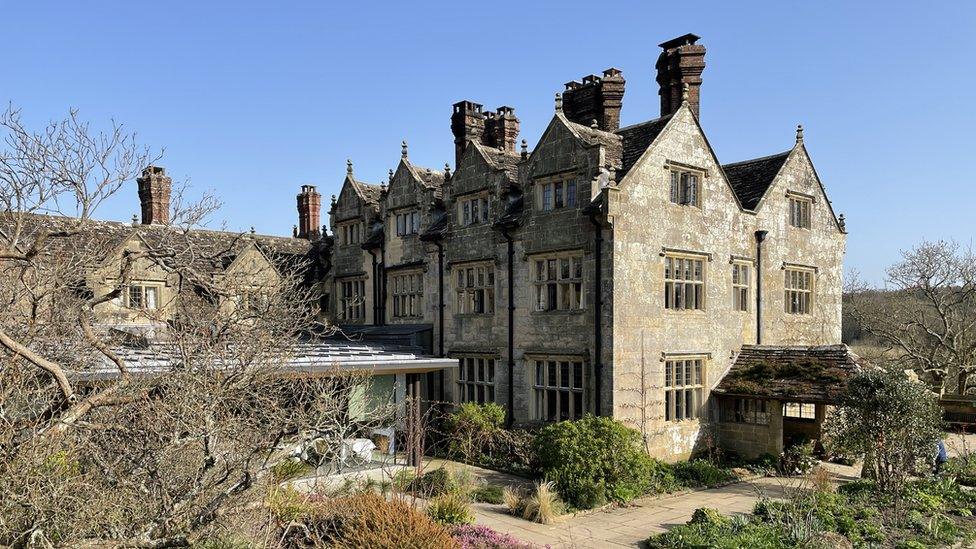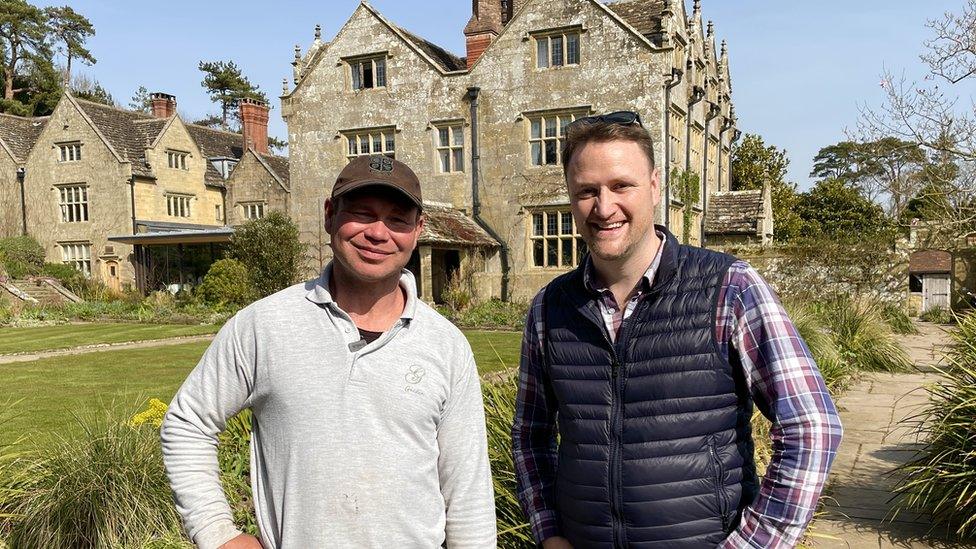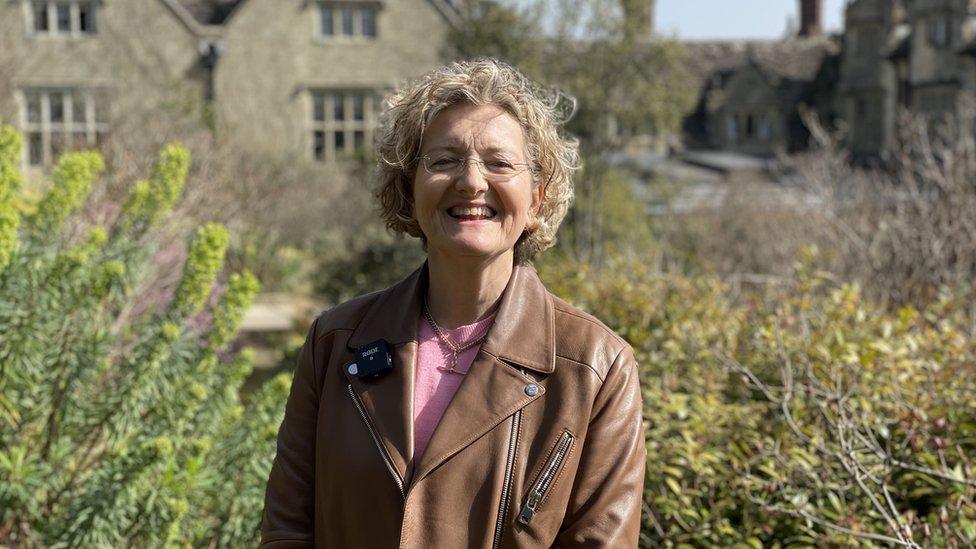Irish gardening hot-head who made the English go wild
- Published

William Robinson rose from relatively humble beginnings in Ireland to the top of his profession
You might not have heard of William Robinson but the chances are he's had an impact on how you view the world.
When you imagine a beautiful cottage garden, with wild roses and drifts of colour - the sort of thing you'd see on greeting cards or old-fashioned chocolate boxes - well, that style is pure Robinson.
But while he advocated a more natural, relaxed approach to gardening he was no shrinking violet.
This Irishman, from relatively humble beginnings, challenged Victorian formality head on, while at the same time ingratiating himself with the great and the good.
He overcame class boundaries, travelled extensively and his published works are still a reference for gardeners, the world over, today.
Unearthing his origins
William Robinson was born in Ireland in July 1838, but his exact birthplace has been a matter of some debate.
Despite writing for a living, he never mentioned his earliest years. Some have suggested he was from County Down but Judith Nesbitt, who is currently writing a book on Robinson, said that recent census information suggested otherwise.
"There are a lot of contested facts about his life... in the 1921 census, which has just come to light, we now know that he says he was born in Queen's county - now County Laois.
"He didn't talk about his parents. His family story was never part of his persona and that did lead to rumours and speculation. People were speculating on how this garden boy from such humble beginnings could come to be lord of the manor of Gravetye."
Judith, who now lives near Robinson's former home of Gravetye Manor in Sussex, is originally from Dungannon in Northern Ireland. She's been fascinated by Robinson since she first learnt about him while visiting the manor, which is now a hotel and restaurant.

Gravetye Manor in Sussex became William Robinson's home
According to her research, Robinson's father was a land agent, so it is unlikely he was a peasant boy but, she said, he still had to earn his keep and make his own way in the world.
"He came up the hard way, from garden boy, to apprentice, to gardener and foreman."
Hothouse temper
Some of that training took place at Ballykilcavan Estate in County Laois. A hot-tempered episode there has become the stuff of legend.
David Walsh-Kemmis now owns the estate - he said he suspected that his great-great-great grandfather, who was in the house at the time, was "maybe a slightly difficult character to deal with" and that a row developed between him and Robinson.
"Robinson decided in the middle of winter 1861 that he'd had enough," David added.
"He opened up the greenhouses, he put out the fires and he left. By the time anyone came out the following day all the plants in the greenhouses were dead, frost-killed, and I suspect his name wasn't particularly well regarded around here after that."
But more than 150 years later the estate's brewery is now cashing in on Robinson's rage, canning a beer bearing his name.
"I always tell people the most famous person that was ever here wasn't anyone in the house, wasn't anyone in the previous generations, it was actually the gardener," said David.
Young man in a hurry
Robinson not only left Ballykilcavan behind after this act of horticultural vandalism, he also left Ireland for England.
Now in his early 20s, Judith said he was a "young man in a hurry".
Within a few years, he became a fellow of the Linnean Society - backed by none other than Charles Darwin.
By 1870, he had written one of his most famous books, The Wild Garden, which is still available today. The following year he launched his own gardening journal called The Garden.
In these publications, he advocated for less formal gardening, mixed borders and for ground cover plants, as well as decrying standard roses and beds with annual flowers in a formal pattern, which were popular in Victorian Britain.
Wild gardening
In 1885, he had acquired enough money from his writings to buy Gravetye Manor in Sussex where he would live the rest of his days. In the garden there he practised what he preached.
Tom Coward, the manor's head gardener, tries to remain true to Robinson's wild gardening style.

Head gardener Tom Coward tells David Maxwell he remains true to Robinson's gardening style
"Wild gardening is to establish plants in places that they are happy and will spread without causing problems.
"Some people say that if you have a population of something that is self-sustaining and spreading then you have something 'wild'.
"(He advocated) dense carpets of perennials that would outcompete the weeds and collide with each other and then the layers of the spring bulbs and the self-sowers."
Garden expert Brendan Little said that Robinson was ahead of his time.
"We're now so aware of biodiversity - and why would you have a manicured lawn that's breaking your heart to mow, when you can naturalise it with bulbs and have a nice succession through the flowering season and produce pollen from your plants for the bumblebees and the butterflies?
"So, it's a no-brainer to garden in the Robinsonian style."
Robinson and women
It's been suggested that Robinson had a problem with women but that is not something Judith Nesbitt agrees with.
"He published the work of women writers, there were five women who contributed to The English Flower Garden.
"He was great friends with the prominent Victorian gardener Gertrude Jekyll. He appointed her editor of The Garden magazine after he stepped down."
It's a view shared by the current head gardener of Jekyll's garden, Munstead Wood, in Surrey. Annabel Woods said he was actually an advocate for women.
"He launched her (Jekyll's) career to be quite honest. Not only did he recognise her abilities in identifying plants, her interest in horticulture - not only that, but he took her on as a photographer and he started her work in journalism.

Judith Nesbitt is writing a book about William Robinson
"For that sort of time in the late 19th Century, that's remarkable and good for him I say."
Robinson legacy
Robinson died in 1935, aged 96, having acquired an impressive manor house and land as far as the eye could see.
While his childhood remained a mystery, he maintained his links with Ireland according to Judith Nesbitt.
"We know that he visited Narrow Water House in Warrenpoint, we know he was corresponding with the Montgomerys in Blessingbourne, Fivemiletown. We know he visited the Botanic Gardens in Belfast and he was a familiar face and a familiar name.
"After his death, Ireland did very much want to claim him and he was after all very much a success story.
"He coined the phrase "wild garden" and you open a magazine today and wild gardens are everywhere. So I think his style, his influence is absolutely pervasive and really relevant today."
With climate change and biodiversity loss very much on the agenda in 2022 his ideas still seem very relevant.
Garden expert Brendan Little said we would all do well to follow his example when it comes to gardening.
"I think sometimes we get paranoid about being in control, about getting every weed out, removing all wild flowers, resorting to the knapsack sprayer.
"I mean you aren't going to get a wonderful feel to a garden without some management and I think the really clever gardens, the ones that work best, are the gardens that are managed but you don't notice the management.
"So, I suppose if there was a message from the whole Robinsonian experience, it is that we can all garden with nature. To garden against nature is hard work and I know which option I would choose."
Gardeners' Corner special: William Robinson's Wild Gardening will be broadcast on 23 April at 09:00 BST on BBC Radio Ulster and will be available afterwards to listen to here and on BBC Sounds.